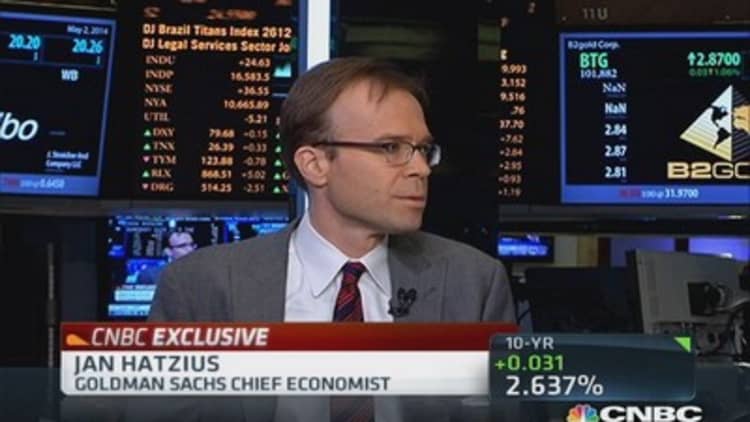
Though disappointed by the labor force participation rate in April's employment report, Goldman Sachs chief economist said the report's strong headline numbers confirmed that the economy's slowdown was a temporary trend.
"It's definitely a glass half full report," Jan Hatzius said Friday during an interview on CNBC's "Squawk on the Street."
The participation rate dropped to near 35-year lows in Friday's jobs report, but Hatzius said he remained optimistic by looking at a longer-term range. The economy has made progress in the last 14 months, though it has not yet reached full employment, Hatzius said.
Just more than 800,000 people left the civilian labor force last month, according to the Bureau of Labor Statistics.
"That was a little disappointing," Hatzius said of the participation rate. "The household survey was a little mixed. We are now back down to the participation levels we had back in December."
Read MorePayrolls jump in Aprilas thaw hits jobs market
Hatzius advised market watchers to not read too much into month-to-month moves in the participation rate. Hatzius has seen the household survey numbers swing wildly from month to month, he said, and a long-term look at those indicators paint an encouraging picture.
With the economy growing at a snail's pace during the first quarter of 2014—coming in at 0.1 percent—the Federal Reserve will likely fall short of its 2.9 percent GDP forecast for year's end, Hatzius said.
"It will be pretty strong, but maybe it's slightly south of what they're predicting," he said.
Read MoreHiring rebounds but more gave up looking for work
The headline numbers of April's jobs report came in much larger than expected. The economy added 288,000 jobs and the unemployment rate dropped to 6.3 percent. The participation rate dropped to 62.8 percent.
The data also show that wage growth was pretty weak, which Hatzius called a "negative." But the absence of tax increases from 2013 helped lift pressure off disposable income and consumer spending, he said.
—By CNBC's Jeff Morganteen.


